The AMD 3rd Gen Ryzen Deep Dive Review: 3700X and 3900X Raising The Bar
by Andrei Frumusanu & Gavin Bonshor on July 7, 2019 9:00 AM EST** = Old results marked were performed with the original BIOS & boost behaviour as published on 7/7.
Benchmarking Performance: Web Tests
While more the focus of low-end and small form factor systems, web-based benchmarks are notoriously difficult to standardize. Modern web browsers are frequently updated, with no recourse to disable those updates, and as such there is difficulty in keeping a common platform. The fast paced nature of browser development means that version numbers (and performance) can change from week to week. Despite this, web tests are often a good measure of user experience: a lot of what most office work is today revolves around web applications, particularly email and office apps, but also interfaces and development environments. Our web tests include some of the industry standard tests, as well as a few popular but older tests.
We have also included our legacy benchmarks in this section, representing a stack of older code for popular benchmarks.
All of our benchmark results can also be found in our benchmark engine, Bench.
WebXPRT 3: Modern Real-World Web Tasks, including AI
The company behind the XPRT test suites, Principled Technologies, has recently released the latest web-test, and rather than attach a year to the name have just called it ‘3’. This latest test (as we started the suite) has built upon and developed the ethos of previous tests: user interaction, office compute, graph generation, list sorting, HTML5, image manipulation, and even goes as far as some AI testing.
For our benchmark, we run the standard test which goes through the benchmark list seven times and provides a final result. We run this standard test four times, and take an average.
Users can access the WebXPRT test at http://principledtechnologies.com/benchmarkxprt/webxprt/
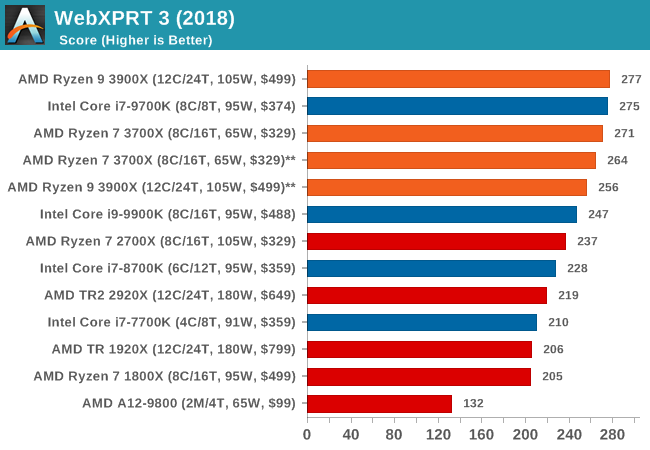
WebXPRT 2015: HTML5 and Javascript Web UX Testing
The older version of WebXPRT is the 2015 edition, which focuses on a slightly different set of web technologies and frameworks that are in use today. This is still a relevant test, especially for users interacting with not-the-latest web applications in the market, of which there are a lot. Web framework development is often very quick but with high turnover, meaning that frameworks are quickly developed, built-upon, used, and then developers move on to the next, and adjusting an application to a new framework is a difficult arduous task, especially with rapid development cycles. This leaves a lot of applications as ‘fixed-in-time’, and relevant to user experience for many years.
Similar to WebXPRT3, the main benchmark is a sectional run repeated seven times, with a final score. We repeat the whole thing four times, and average those final scores.
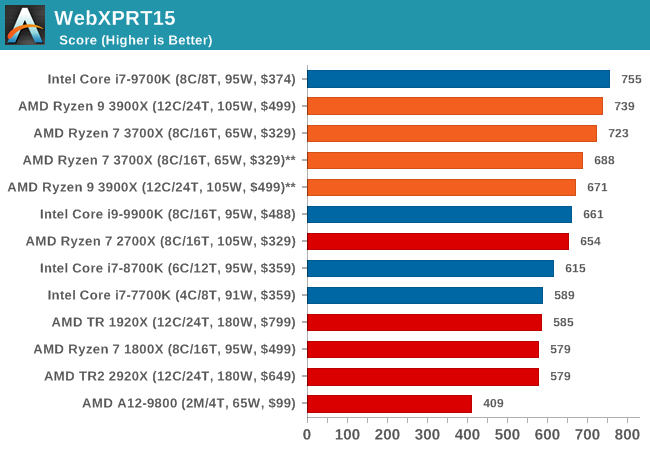
Speedometer 2: JavaScript Frameworks
Our newest web test is Speedometer 2, which is a accrued test over a series of javascript frameworks to do three simple things: built a list, enable each item in the list, and remove the list. All the frameworks implement the same visual cues, but obviously apply them from different coding angles.
Our test goes through the list of frameworks, and produces a final score indicative of ‘rpm’, one of the benchmarks internal metrics. We report this final score.
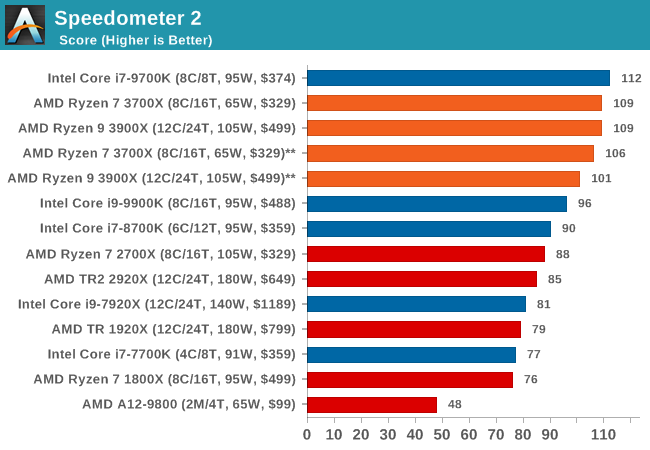
Google Octane 2.0: Core Web Compute
A popular web test for several years, but now no longer being updated, is Octane, developed by Google. Version 2.0 of the test performs the best part of two-dozen compute related tasks, such as regular expressions, cryptography, ray tracing, emulation, and Navier-Stokes physics calculations.
The test gives each sub-test a score and produces a geometric mean of the set as a final result. We run the full benchmark four times, and average the final results.
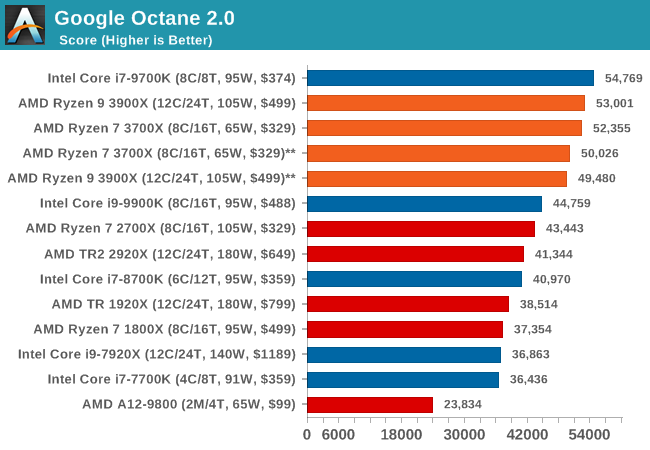
Mozilla Kraken 1.1: Core Web Compute
Even older than Octane is Kraken, this time developed by Mozilla. This is an older test that does similar computational mechanics, such as audio processing or image filtering. Kraken seems to produce a highly variable result depending on the browser version, as it is a test that is keenly optimized for.
The main benchmark runs through each of the sub-tests ten times and produces an average time to completion for each loop, given in milliseconds. We run the full benchmark four times and take an average of the time taken.
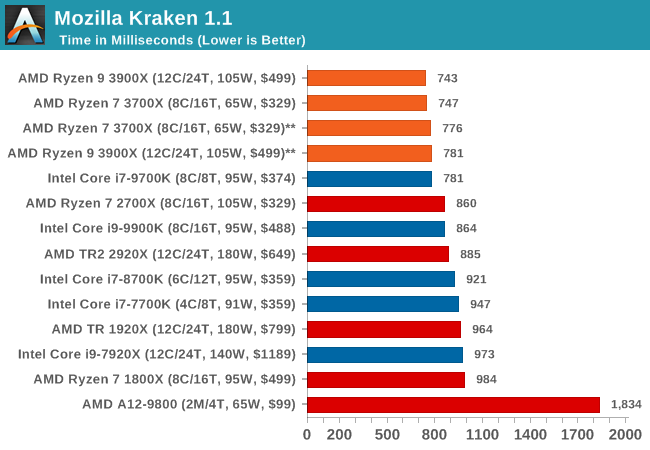
Web Tests Analysis
Overall, in the web tests, the new Ryzen 3900X and 3700X perform very well with both chips showcasing quite large improvements over the 2700X.
We’re seeing quite an interesting match-up against Intel’s 9700K here, which is leading all of the benchmarks. The reason for this is that SKU has SMT turned off. The singe-threaded performance advantage of this is that the CPU core no longer has to share the µOP cache structure between to different threads, and has the whole capacity dedicated to one thread. Web workloads in particular are amongst the most instruction pressure heavy workloads out there, and they benefit extremely from turning SMT off on modern cores.
Whilst we didn’t have the time yet to test the new 3900X and 3700X with SMT off, AMD’s core and op cache works the same in that it’s sharing the capacity amongst two threads, statically partitioning it. I’m pretty sure we’d see larger increases in the web benchmarks when turning off SMT as well, and we’ll be sure to revisit this particular point in the future.










447 Comments
View All Comments
Maxiking - Tuesday, July 23, 2019 - link
LOOOOOOL, so we have a guy confirming AMD doing fraund by misleading people about the frequency, instead of acknowledging the fraund, we gonna talk about semantics.Yeah, if you get sentenced for a sexual assault, you should sue then anyone who has accussed you of raping. Just wow.
Brilliant logic, sir.
Maxiking - Tuesday, July 23, 2019 - link
*fraudQasar - Tuesday, July 23, 2019 - link
still valid there buddy.. like has been said, you are the only one throwing the word fraud around, and that amd should be sued over this. so what everMaxiking - Tuesday, July 23, 2019 - link
And again... let me copy paste."You are uneducated, TDP doesn't mean power consumption or the highest peak but the amount of heat dissipated, it informs you how much of heat the cooler must be able to dissipate in order to keep the cpu cool enough to run.
Get it? 1700x TDP was 95W yet there were tasks it managed to consume 120 or even 140w on stock settings. Like do you even watch reviews? It was the same with 2700x.
but mimimimimimi AMD good mimimimimi Intel bad"
Korguz - Tuesday, July 23, 2019 - link
and yet, you still refuse to admit, that intel has its own issues with fraud and misleading its own customers.does he actually say its fraud ?? not directly, seems only YOU keep saying that, and only YOU say amd should be sued for it. again.., i would love to see YOU file a suit against amd for it, considering you are so hung up about it but you wont, cause you are all talk, no action, and probably know.. you wouldnt get very far with that law suit
Maxiking - Tuesday, July 23, 2019 - link
I said a few times... I don't tend to buy amd products so no, I am not gonna sue anybody.And as pointed out in the video, in his German one, he works for a retailer selling prebuilt pcs.. People keep returning pcs with AMD cpus becaue they do not boost to the promised frequency. You there, there are something like laws, if you write on the box 4.6ghz, it must reach it.
You are so knowledgeable, sharp minded and analytical when comes to meaning of words and what people want to say, you should sue Intel on your own, should be easy.
Korguz - Tuesday, July 23, 2019 - link
why not ?? going by how dead set you are about this.. seems like it would be an easy win for you.. ooooohhhh in the german one.. i understand now.. too bad i dont speak german so i cant confirm this... and if some one writes on the box that something uses a certain amount of power.. then it should use it.. not 50 to 100 watts more.. i have a few friends that buy intels cpus.. they see it uses 95 watts of power.. so they get a HSF that can dissipate that much power.. then wonder why their cpu throttles and runs slow when under load... then i point then to the link i just posted,and they are not happy.. and now need to go buy yet another HSF to handle the extra power.You are so knowledgeable, sharp minded and analytical when comes to meaning of words and what people want to say, you should sue Amd on your own, should be easy. again, too bad you wont.. cause you are all talk. have a good day sir..
Maxiking - Thursday, July 25, 2019 - link
Again, you have once again showed your AMD fanboyism.There is written: TDP 95W. I already explained what TDP means. AMD's TDP isn't accurate either.
AMD has 4.6ghz on the box whilst a bing number cpus does not REACH IT AT ALL. There is no "*" moniker next the 4.6ghz claim and they do not say that their cpu may not reach the frequency at all. In fact, there is a video from AMD on youtube promised even higher frequency, lol. Up to 4.75 ghz.
So yeah, stop being desperate and forcing Intel into the debate.
Because your childish attempts are futile, this is not about AMD or Intel. It is about us consumers. What will be next? 6 Ghz on the box?
Maxiking - Thursday, July 25, 2019 - link
AMD has 4.6ghz on the box whlist a big number of cpus do not REACH IT AT ALL under any load, conditions. Typing on phone is just cancer.Korguz - Thursday, July 25, 2019 - link
and again, like in another thread, you showed how much you hate amd, and are biased against them, and you call me an amd fanboy, you are just as much an intel fanboy. FYI, IF you actually READ the link i posted, you would see that intels 95 watts, is pretty much a MINIMUM their chips use, in reality, its more like 50 to 100 ABOVE that, and also.. amd is A LOT closer then intel is to the TDP they state, but again.. to be fair, amd AND intel use and come do different values for TDP, but you cant see passed your hated for amd to see this.. you are the one that has to resort to name calling, so WHO is being childish ?? what wil be next, intel claiming their cpus use 100 watts, but in reality, they use 300 ?